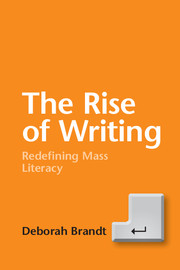3 - Occupation: author
Writing over reading in the literacy development of contemporary young adults
Published online by Cambridge University Press: 05 January 2015
Summary
The belief that writing ability is a subsidiary of reading ability runs deep in American society and schooling. You can only write as well as you can read. The best way to learn how to write is to read, read, and read some more. Reading is the best way to exercise the mind. Commonplaces like these are easy to find in the advice of teachers and often well-known authors as well. Reading is considered the fundamental skill, the prior skill, the formative skill, the gateway to writing. Students’ poor writing will often be ascribed to their lack of reading experience. When writing is taught to very young children, it is often in order to introduce or reinforce reading. As schooling progresses, reading becomes the pump that primes writing assignments and assessments. At minimum, reading is thought to teach the techniques of textuality, the vocabulary, diction, spelling, punctuation, and syntax that any aspiring writer must master. Even more profound, reading is thought to shape character and intellect, and provide the wisdom and worldliness that make one worthy to write. In every way reading is treated as the well from which writing springs. We need only try to reverse the commonplace advice to appreciate the superior position that reading holds. How many would readily agree that you can only read as well as you can write? Or that the best way to learn how to read is to write, write, and write some more? Or that writing is the best way to exercise the mind? These assertions may seem less intuitively true, if not wrongheaded, even though literacy researchers emphasize the interconnectedness and complementarity of reading and writing, and how the two emerge from a commonly developed pool of linguistic resources. Logically there can be no reading without writing and no writing without reading. Yet writing has never attained the same formative and morally wholesome status as reading. Indeed, writing unmoored from the instructiveness of reading is often considered solipsistic and socially dangerous (Keen 2007). We honor the well-read life and perhaps the well-written text. But the well-written life? The phrase has little meaning. Through most of the recent history of mass schooling, writing has been forced under the wing of reading, domesticated as a school-based subject, and made to function companionably within and in support of the ideological projects of mass reading.
- Type
- Chapter
- Information
- The Rise of WritingRedefining Mass Literacy, pp. 89 - 134Publisher: Cambridge University PressPrint publication year: 2014

